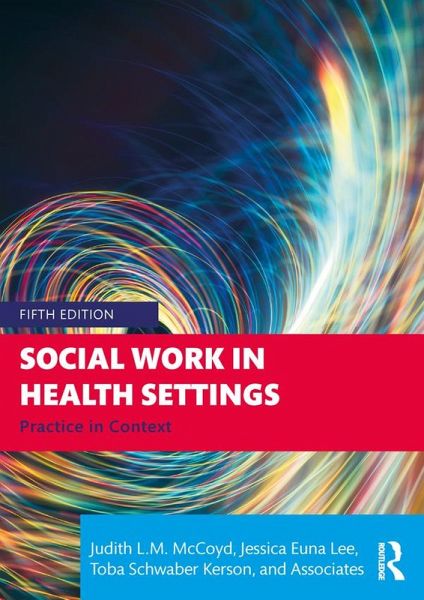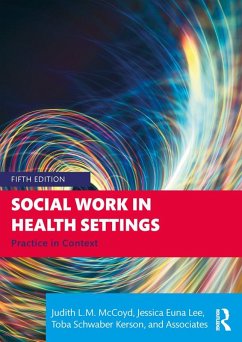
Social Work in Health Settings (eBook, ePUB)
Practice in Context
Versandkostenfrei!
Sofort per Download lieferbar
59,95 €
inkl. MwSt.
Weitere Ausgaben:

PAYBACK Punkte
30 °P sammeln!
This fully revised and expanded fifth edition of Social Work in Health Settings: Practice in Context maintains its use of the Practice-in-Context (PiC) decision-making framework to explore a wide range of social work services in healthcare settings. The PiC is updated in this edition to attend to social determinants of health and structural conditions. The PiC framework is applied in over 30 case chapters to reflect varied health and social care settings with multiple populations.Fully updated to reflect the landscape of healthcare provision in the US since the Affordable Care Act was reaffirm...
This fully revised and expanded fifth edition of Social Work in Health Settings: Practice in Context maintains its use of the Practice-in-Context (PiC) decision-making framework to explore a wide range of social work services in healthcare settings. The PiC is updated in this edition to attend to social determinants of health and structural conditions. The PiC framework is applied in over 30 case chapters to reflect varied health and social care settings with multiple populations.
Fully updated to reflect the landscape of healthcare provision in the US since the Affordable Care Act was reaffirmed in 2020, the cases are grounded by "primer" chapters to illustrate the necessary decisional and foundational skills for best practices in social work in health settings. The cases cover micro through macro level work with individuals, families, groups, and communities across the life course. The PiC framework helps maintain focus on each of the practice decisions a social worker must make when working with a variety of clients (including military veterans, refugees, LGBTQ+ clients).
The ideal textbook for social work in healthcare and clinical social work classes, this thought-provoking volume thoroughly integrates social work theory and practice and provides an excellent opportunity for understanding particular techniques and interventions.
Fully updated to reflect the landscape of healthcare provision in the US since the Affordable Care Act was reaffirmed in 2020, the cases are grounded by "primer" chapters to illustrate the necessary decisional and foundational skills for best practices in social work in health settings. The cases cover micro through macro level work with individuals, families, groups, and communities across the life course. The PiC framework helps maintain focus on each of the practice decisions a social worker must make when working with a variety of clients (including military veterans, refugees, LGBTQ+ clients).
The ideal textbook for social work in healthcare and clinical social work classes, this thought-provoking volume thoroughly integrates social work theory and practice and provides an excellent opportunity for understanding particular techniques and interventions.
Dieser Download kann aus rechtlichen Gründen nur mit Rechnungsadresse in A, B, BG, CY, CZ, D, DK, EW, E, FIN, F, GR, HR, H, IRL, I, LT, L, LR, M, NL, PL, P, R, S, SLO, SK ausgeliefert werden.













